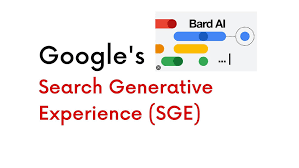In an era where access to information is virtually limitless, Google is spearheading an ambitious experiment with generative AI, a technology that could reshape the way news and information are presented and consumed.
Since May, Google has been rolling out a new search experience powered by generative AI, known as the Search Generative Experience (SGE).
This cutting-edge technology aims to provide users with quick, concise summaries in response to search queries, drawing from a vast repository of historical data.
While this innovation promises to deliver efficient access to information, it has also raised significant concerns, particularly among publishers, about the future of journalism and the evolving dynamics of the media landscape.

SGE, an opt-in experiment for users, seeks to provide succinct summaries generated from various web sources. Users can then “dig deeper” by exploring the provided links.
However, this ambitious undertaking has sparked worries among publishers, notably in terms of web traffic, accreditation, and the accuracy of AI-generated summaries.
Foremost among these concerns is the question of compensation for publishers, a contentious issue in the rapidly evolving domain of generative AI.
Publishers are apprehensive about the potential decrease in web traffic. SGE summaries may cater to users’ informational needs to such an extent that they bypass traditional website links.
This shift could significantly affect publishers’ click-through rates and, subsequently, their ability to secure advertisers.
There is also the fear that publishers might not receive proper credit as the original source of information featured in SGE summaries.
While Google has introduced a tool called Google-Extended, which gives publishers the option to block their content from being used for training AI models, this tool does not allow publishers to prevent their content from appearing in SGE summaries without simultaneously vanishing from the traditional Google search results.
This lack of transparency about how publishers can effectively block content specifically for SGE has left publishers in a state of uncertainty about their role in this evolving landscape.
Publishers are also questioning the fairness of Google’s compensation policies. They emphasize the need for a “healthier value exchange” between publishers and tech companies.
While Google has expressed its commitment to directing valuable traffic to creators, including news publishers, the specifics of compensation remain a matter of ongoing discussions.
Generative AI, as it continues to shape the landscape of information consumption, underscores the formidable challenges faced by publishers as they adapt to this new paradigm.
The intersection of technology, journalism, and business models has become increasingly intricate. Stakeholders in the media industry are navigating uncharted waters, seeking a balanced and sustainable future for journalism in the digital age.

Google’s introduction of generative AI, particularly SGE, represents a significant milestone in the ever-evolving relationship between technology and journalism.
As digital information consumption patterns shift, Google, a technology behemoth renowned for its global influence, is taking proactive measures to ensure that its search experience remains relevant and useful to users.
Nevertheless, this transition has raised complex questions about the role of technology companies in the dissemination of news and the challenges of preserving the integrity, diversity, and accessibility of quality journalism
As the media landscape undergoes a profound transformation, it becomes crucial for all stakeholders to guarantee that high-quality, trustworthy information remains at the heart of the digital age.
In conclusion, Google’s foray into generative AI through SGE presents both opportunities and challenges.
While it promises a more streamlined and efficient way for users to access information, it has prompted concerns about the impact on publishers and the broader media ecosystem.
As technology continues to redefine how we consume news and information, it underscores the need for adaptability, innovation, and collaborative efforts to ensure that the values of quality journalism are preserved and celebrated in the digital age.

